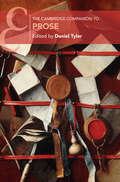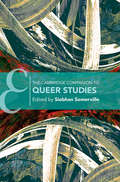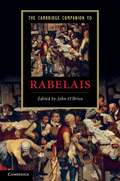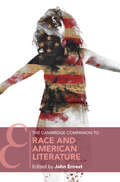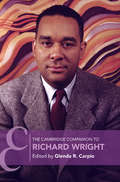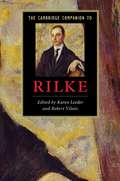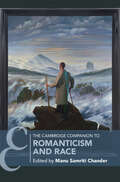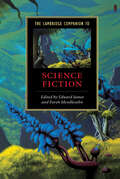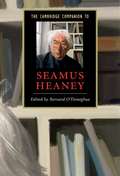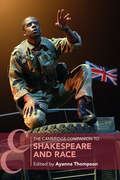- Table View
- List View
The Cambridge Companion to Prose (Cambridge Companions to Literature)
by Daniel TylerThis Companion provides an introduction to the craft of prose. It considers the technical aspects of style that contribute to the art of prose, examining the constituent parts of prose through a widening lens, from the smallest details of punctuation and wording to style more broadly conceived. The book is concerned not only with prose fiction but with creative non-fiction, a growing area of interest for readers and aspiring writers. Written by internationally-renowned critics, novelists and biographers, the essays provide readers and writers with ways of understanding the workings of prose. They are exemplary of good critical practice, pleasurable reading for their own sake, and both informative and inspirational for practising writers. The Cambridge Companion to Prose will serve as a key resource for students of English literature and of creative writing.
The Cambridge Companion to Proust
by Richard BalesThe Cambridge Companion to Proust provides a broad account of the major features of Marcel Proust's great work A la recherche du temps perdu (1913-1927). The specially commissioned essays, by acknowledged experts on Proust, address a wide range of issues relating to his work. Progressing from background and biographical material, the chapters investigate such essential areas as the composition of the novel, its social dimension, the language in which it is couched, its intellectual parameters and its humor.
The Cambridge Companion to Pushkin
by Andrew KahnAlexander Pushkin stands in a unique position as the founding father of Russian literature. In this Companion, leading scholars discuss Pushkin's work in its political, literary, social and intellectual contexts. In the first part of the book individual chapters analyse his poetry, his theatrical works, his narrative poetry and historical writings. The second section explains and samples Pushkin's impact on broader Russian culture by looking at his enduring legacy in music and film from his own day to the present. Special attention is given to the reinvention of Pushkin as a cultural icon during the Soviet period. No other volume available brings together such a range of material and such comprehensive coverage of all Pushkin's major and minor writings. The contributions represent state-of-the-art scholarship that is innovative and accessible, and are complemented by a chronology and a guide to further reading.
The Cambridge Companion to Queer Studies (Cambridge Companions to Literature)
by Siobhan B. SomervilleThis Companion provides a guide to queer inquiry in literary and cultural studies. The essays represent new and emerging areas, including transgender studies, indigenous studies, disability studies, queer of color critique, performance studies, and studies of digital culture. Rather than being organized around a set of literary texts defined by a particular theme, literary movement, or demographic, this volume foregrounds a queer critical approach that moves across a wide array of literary traditions, genres, historical periods, national contexts, and media. This book traces the intellectual and political emergence of queer studies, addresses relevant critical debates in the field, provides an overview of queer approaches to genres, and explains how queer approaches have transformed understandings of key concepts in multiple fields.
The Cambridge Companion to Rabelais
by John O'BrienThe Franciscan monk, humanist and physician Fran ois Rabelais, who flourished in sixteenth-century France, is widely considered as the Renaissance's greatest comic writer. His work - including most notably Gargantua and Pantagruel - continues to enthral readers with its complex and delicately crafted humour. 'Rabelaisian' and 'Gargantuan' have entered the lexicon but are often misunderstood; this Companion explains the literary and historical reality behind these notions. It provides an accessible account of Rabelais' major works and the contextual information and conceptual tools needed to understand the author and his world. The most up-to-date book on Rabelais to be designed specifically for English-speaking audiences, the Companion is intended to enable a broad spectrum of readers both to appreciate and to enjoy Rabelais. With a detailed guide to further reading and a chronology, and with all quotations given in translation, this is an ideal guide for students and scholars of French and comparative literature.
The Cambridge Companion to Race and American Literature (Cambridge Companions to Literature)
by John ErnestRace is central to American history. It is impossible to understand the United States without understanding how race has been defined and deployed at every stage of the nation's history. Offering a comprehensive and accessible introduction to the history of race, The Cambridge Companion to Race and American Literature shows how this history has been represented in literature, and how those representations have influenced American culture. Written by leading scholars in in African American, Latinx, Asian American, Native American, and white American studies, the essays in this volume address the centrality of race in American literature by foregrounding the conflicts across different traditions and different modes of interpretation. This volume explores the unsteady foundations of American literary history, examines the hardening of racial fault lines throughout the nineteenth century and into the twentieth, and then considers various aspects of the multiple literary and complexly interrelated traditions that emerged from this fractured cultural landscape.
The Cambridge Companion to Ralph Ellison
by Ross PosnockRalph Ellison's classic 1952 novel Invisible Man is one of the most important and controversial novels in the American canon and remains widely read and studied. This Companion provides the most up-to-date introduction to this influential and significant novelist and critic and to his masterpiece. It features newly commissioned essays, a chronology and a guide to further reading. The essays reveal new dimensions of Ellison's art radiating out from Invisible Man into new domains - technology, political theory, law, photography, music, religion - and recover the compelling urgency and relevance of Ellison's political and artistic vision. Since Ellison's death his published oeuvre has been expanded by several major volumes - his collected essays, the fragment of a novel, Juneteenth (1999), letters and short stories - examined here in the context of his life and work. Students and scholars of Ellison and of American and African-American literature will find this an invaluable and accessible guide.
The Cambridge Companion to Ralph Waldo Emerson
by Joel Porte Saundra MorrisThe Cambridge Companion to Ralph Waldo Emerson provides a critical introduction to pastor and poet, Ralph Waldo Emerson, author of Nature and The Conduct of Life. The tradition of American literature and philosophy as we know it at the end of the twentieth century was largely shaped by Emerson's example and practice. This volume offers students, scholars, and the general reader a collection of fresh interpretations of Emerson's writing, milieu, influence, and cultural significance. All essays are newly commissioned for this volume, written at an accessible yet challenging level, and augmented by a comprehensive chronology and bibliography.
The Cambridge Companion to Richard Wright (Cambridge Companions to Literature)
by Glenda R. CarpioHailed as 'the father of black literature in the twentieth century', Richard Wright was an iconoclast, an intellectual of towering stature, whose multidisciplinary erudition rivals only that of W. E. B. Du Bois. This collection captures Wright's immense power, which has made him a beacon for writers across decades, from the civil rights era to today. Individual essays examine Wright's art as central to his intellectual life and shed new light on his classic texts - Native Son and Black Boy. Other essays turn to his short fiction, and non-fiction as well as his lesser-known work in journalism and poetry, paying particular attention to manuscripts in Wright's archive - unpublished letters and novels, plans for multivolume works - that allow us to see the depth and expansiveness of his aesthetic and political vision. Exploring how Wright's expatriation to France facilitated a broadening of this vision, contributors challenge the idea that expatriation led to Wright's artistic decline.
The Cambridge Companion to Rilke
by Karen Leeder Robert VilainOften regarded as the greatest German poet of the twentieth century, Rainer Maria Rilke (1875-1926) remains one of the most influential figures of European modernism. In this Companion, leading scholars offer informative and thought-provoking essays on his life and social context, his correspondence, all his major collections of poetry including most famously the Duino Elegies and Sonnets to Orpheus, and his seminal novel of Modernist anxiety, The Notebooks of Malte Laurids Brigge. Rilke's critical contexts are explored in detail: his relationship with philosophy and the visual arts, his place within modernism and his relationship to European literature, and his reception in Europe and beyond. With its invaluable guide to further reading and a chronology of Rilke's life and work, this Companion will provide an accessible, engaging account of this extraordinary poet whose legacy looms so large today.
The Cambridge Companion to Robert Frost
by Robert FaggenThis 2001 collection of specially-commissioned essays by experts in the field explores key dimensions of Robert Frost's poetry and life. Frost remains one of the most memorable and beguiling of modern poets. Writing in the tradition of Virgil, Milton, and Wordsworth, he transformed pastoral and georgic poetry both in subject matter and form. Mastering the rhythms of ordinary speech, Frost made country life the point from which to view the world and the complexities of human psychology. The essays in this volume enable readers to explore Frost's art and thought, from the controversies of his biography to his subtle reinvention of poetic and metric traditions and the conflicts in his thought about politics, gender, science and religion. This volume will bring fresh perspectives to the lyric, narrative and dramatic poetry of an American master, and its chronology and guide to further reading will prove valuable to scholars and students alike.
The Cambridge Companion to Roman Satire
by Kirk FreudenburgSatire as a distinct genre was first developed by the Romans and regarded as completely 'their own'. This Companion's international contributors provide a stimulating introduction to the genre and its individual proponents aimed particularly at non-specialists. Roman satires are explored both as generic, literary phenomena and as highly symbolic and effective social activities. Satire's transformation in late antiquity and reception in more recent centuries is also covered.
The Cambridge Companion to Romanticism and Race (Cambridge Companions to Literature)
by Manu Samriti ChanderAmidst the popularization of race science and rapid colonial expansion that characterized the Romantic era, newly urgent discussions about the morality and legality of slavery emerged that would pave the way for formal abolition. The thirteen essays collected here make clear that these developments thoroughly informed Romantic-era literature: the very terms that have long defined Romanticism – revolution and radicalism, poetry and “powerful feeling,” the solitary self and the social world – were shaped by a changing global order in which race figured centrally. Combining academic rigor with accessibility, this diverse group of scholars presents specialists and non-specialists alike with a rich picture of this key moment in the literary and cultural history of race. Engaging with the distinctly Romantic meanings of race, chapters invite readers to consider how eighteenth- and nineteenth-century ideas about difference continue to shape the modern world.
The Cambridge Companion to Rousseau
by Patrick RileyUniversally regarded as the greatest French political theorist and philosopher of education of the Enlightenment, and probably the greatest French social theorist tout court, Rousseau was an important forerunner of the French Revolution, though his thought was too nuanced and subtle ever to serve as mere ideology. This 2001 volume systematically surveys the full range of Rousseau's activities in politics and education, psychology, anthropology, religion, music and theater.
The Cambridge Companion to Rudyard Kipling
by Howard J. BoothRudyard Kipling (1865-1936) is among the most popular, acclaimed and controversial of writers in English. His books have sold in great numbers, and he remains the youngest writer to have won the Nobel Prize for literature. Many associate Kipling with poems such as 'If-', his novel Kim, his pioneering use of the short story form and such works for children as the Just So Stories. For others, though, Kipling is the very symbol of the British Empire and a belligerent approach to other peoples and races. This Companion explores Kipling's main themes and texts, the different genres in which he worked and the various phases of his career. It also examines the 'afterlives' of his texts in postcolonial writing and through adaptations of his work. With a chronology and guide to further reading, this book serves as a useful introduction for students of literature and of Empire and its after effects.
The Cambridge Companion to Salman Rushdie
by Abdulrazak GurnahRushdie is a major contemporary writer, who engages with some of the vital issues of our times: migrancy, postcolonialism, religious authoritarianism. This Companion offers a comprehensive introduction to his entire oeuvre. Part I provides thematic readings of Rushdie and his work, with chapters on how Bollywood films are intertextual with the fiction, the place of family and gender in the work, the influence of English writing and reflections on the fatwa. Part II discusses Rushdie's importance for postcolonial writing and provides detailed interpretations of his fiction. In one volume, this book provides a stimulating introduction to the author and his work in a range of expert essays and readings. With its detailed chronology of Rushdie's life and a comprehensive bibliography of further reading, this volume will be invaluable to undergraduates studying Rushdie and to the general reader interested in his work.
The Cambridge Companion to Saussure
by Carol SandersThis Companion offers an original new account of Ferdinand de Saussure, widely considered to be the founder of modern Linguistics as well as Structuralism. In addition to looking at his pioneering Course in General Linguistics, contributors consider his lesser-known early work, more recently-discovered manuscripts, and influence on other disciplines such as cultural studies, philosophy, literature and semiotics. With contributions by specialists in each field, this comprehensive guide creates a unique picture of the lasting importance of Saussure's thought.
The Cambridge Companion to Science Fiction
by Farah Mendlesohn Edward JamesScience fiction is at the intersection of numerous fields. It is literature which draws on popular culture, and engages in speculation about science, history, and all varieties of social relations. This volume brings together essays by scholars and practitioners of science fiction, which look at the genre from different angles. It examines science fiction from Thomas More to the present day; and introduces important critical approaches (including Marxism, postmodernism, feminism and queer theory).
The Cambridge Companion to Scottish Literature
by Gerard Carruthers Liam McilvanneyScotland's rich literary tradition is a product of its unique culture and landscape, as well as of its long history of inclusion and resistance to the United Kingdom. Scottish literature includes masterpieces in three languages - English, Scots and Gaelic - and global perspectives from the diaspora of Scots all over the world. This Companion offers a unique introduction, guide and reference work for students and readers of Scottish literature from the pre-medieval period to the post-devolution present. Essays focus on key periods and movements (the Scottish Enlightenment, Scottish Romanticism, the Scottish Renaissance), genres (the historical novel, Scottish Gothic, 'Tartan Noir') and major authors (Burns, Scott, Stevenson, MacDiarmid and Spark). A chronology and guides to further reading in each chapter make this an ideal overview of a national literature that continues to develop its own distinctive style.
The Cambridge Companion to Seamus Heaney
by Bernard O'DonoghueSeamus Heaney is a unique phenomenon in contemporary literature, as a poet whose individual volumes (such as his Beowulf translation, and individual volumes of poems such as Electric Light and District and Circle) have been high in the bestseller lists for decades. Since winning the Nobel Prize for Literature, he has come to be considered one of the most important English language poets in the world. This Companion gives an up-to-date overview of his career thus far, and of his reception in Ireland, England and around the world. Its distinguished contributors offer detailed readings of all his major publications, in poetry, prose and translation. The essays further explore the central themes of his poetry, his relations with other writers, and his prose writing. Designed for students, this volume will also have much to interest and inform the general reader and admirer of Heaney's unique poetic voice.
The Cambridge Companion to Sensation Fiction
by Andrew ManghamIn 1859 the popular novelist Wilkie Collins wrote of a ghostly woman, dressed from head to toe in white garments, laying her cold, thin hand on the shoulder of a young man as he walked home late one evening. His novel The Woman in White became hugely successful and popularised a style of writing that came to be known as sensation fiction. This Companion highlights the energy, the impact and the inventiveness of the novels that were written in 'sensational' style, including the work of Mary Elizabeth Braddon, Mrs Henry Wood and Florence Marryat. It contains fifteen specially-commissioned essays and includes a chronology and a guide to further reading. Accessible yet rigorous, this Companion questions what influenced the shape and texture of the sensation novel, and what its repercussions were both in the nineteenth century and up to the present day.
The Cambridge Companion to Shakespeare
by Stanley Wells Margreta De GraziaWritten by a team of leading international scholars, this Companion is designed to illuminate Shakespeare's works through discussion of the key topics of Shakespeare studies. Twenty-one essays provide lively and authoritative approaches to recent scholarship and criticism for readers keen to expand their knowledge and appreciation of Shakespeare. The book contains stimulating chapters on traditional topics such as Shakespeare's biography and the transmission of his texts. Individual readings of the plays are given in the context of genre as well as through the cultural and historical perspectives of race, sexuality and gender, and politics and religion. Essays on performance survey the latest digital media as well as stage and film. Throughout the volume, contributors discuss Shakespeare in a global as well as a national context, a dramatist with a long and constantly mutating history of reception and performance.
The Cambridge Companion to Shakespeare and Contemporary Dramatists
by Ton HoenselaarsWhile Shakespeare's popularity has continued to grow, so has the attention paid to the work of his contemporaries. The contributors to this Companion introduce the distinctive drama of these playwrights, from the court comedies of John Lyly to the works of Richard Brome in the Caroline era. With chapters on a wide range of familiar and lesser-known dramatists, including Thomas Kyd, Christopher Marlowe, Ben Jonson, John Webster, Thomas Middleton and John Ford, this book devotes particular attention to their personal and professional relationships, occupational rivalries and collaborations. Overturning the popular misconception that Shakespeare wrote in isolation, it offers a new perspective on the most impressive body of drama in the history of the English stage.
The Cambridge Companion to Shakespeare and Popular Culture
by Robert ShaughnessyThis Companion, first published in 2007, explores the remarkable variety of forms that Shakespeare's life and works have taken over the course of four centuries, ranging from the early modern theatrical marketplace to the age of mass media, and including stage and screen performance, music and the visual arts, the television serial and popular prose fiction. The book asks what happens when Shakespeare is popularized, and when the popular is Shakespeareanized; it queries the factors that determine the definitions of and boundaries between the legitimate and illegitimate, the canonical and the authorized and the subversive, the oppositional, the scandalous and the inane. Leading scholars discuss the ways in which the plays and poems of Shakespeare, as well as Shakespeare himself, have been interpreted and reinvented, adapted and parodied, transposed into other media, and act as a source of inspiration for writers, performers, artists and film-makers worldwide.
The Cambridge Companion to Shakespeare and Race (Cambridge Companions to Literature)
by Ayanna ThompsonThe Cambridge Companion to Shakespeare and Race shows teachers and students how and why Shakespeare and race are inseparable. Moving well beyond Othello, the collection invites the reader to understand racialized discourses, rhetoric, and performances in all of Shakespeare's plays, including the comedies and histories. Race is presented through an intersectional approach with chapters that focus on the concepts of sexuality, lineage, nationality, and globalization. The collection helps students to grapple with the unique role performance plays in constructions of race by Shakespeare (and in Shakespearean performances), considering both historical and contemporary actors and directors. The Cambridge Companion to Shakespeare and Race will be the first book that truly frames Shakespeare studies and early modern race studies for a non-specialist, student audience.
